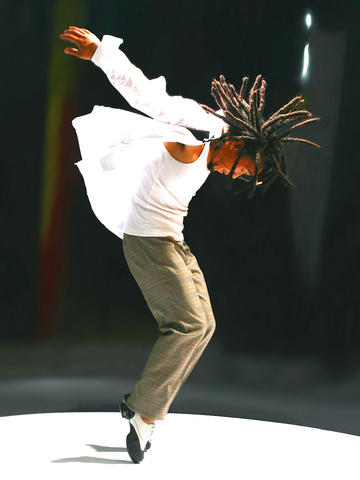After the huge success of their summer workshops and performances, Dance Works (舞工廠舞團) return to the stage this weekend with their Fred Astaire-inspired modern tap performance 160x24h Tapcode (踢踏密碼).
Taiwan's preeminent tap group, led by principal dancer and choreographer Rex Peng (彭承佑), will perform a variety of dance numbers reflecting the movement and sounds taken from the average day of a person. The performance begins tonight at the Taipei Family Theater (台北市親子劇場).
Peng created 160x24h Tapcode as a means of exploring the rhythmic connection between various musical styles and tap dance moves, saying in a recent interview that tap dance is similar to freestyle jazz.

PHOTO: COURTESY OF DANCE WORKS
The live band, however, featuring sax, piano, trumpet and guitar isn't limited to jazz standards. The spontaneous tap moves from the dancers will be matched by a lineup of tunes ranging from funk, blues, hip-hop and classical genres - music that has influenced tap dance since its inception in the US in the late 19th century and influences Peng's choreography.

PHOTO: COURTESY OF DANCE WORKS

The unexpected collapse of the recall campaigns is being viewed through many lenses, most of them skewed and self-absorbed. The international media unsurprisingly focuses on what they perceive as the message that Taiwanese voters were sending in the failure of the mass recall, especially to China, the US and to friendly Western nations. This made some sense prior to early last month. One of the main arguments used by recall campaigners for recalling Chinese Nationalist Party (KMT) lawmakers was that they were too pro-China, and by extension not to be trusted with defending the nation. Also by extension, that argument could be

Aug. 4 to Aug. 10 When Coca-Cola finally pushed its way into Taiwan’s market in 1968, it allegedly vowed to wipe out its major domestic rival Hey Song within five years. But Hey Song, which began as a manual operation in a family cow shed in 1925, had proven its resilience, surviving numerous setbacks — including the loss of autonomy and nearly all its assets due to the Japanese colonial government’s wartime economic policy. By the 1960s, Hey Song had risen to the top of Taiwan’s beverage industry. This success was driven not only by president Chang Wen-chi’s

Last week, on the heels of the recall election that turned out so badly for Taiwan, came the news that US President Donald Trump had blocked the transit of President William Lai (賴清德) through the US on his way to Latin America. A few days later the international media reported that in June a scheduled visit by Minister of National Defense Wellington Koo (顧立雄) for high level meetings was canceled by the US after China’s President Xi Jinping (習近平) asked Trump to curb US engagement with Taiwan during a June phone call. The cancellation of Lai’s transit was a gaudy

The centuries-old fiery Chinese spirit baijiu (白酒), long associated with business dinners, is being reshaped to appeal to younger generations as its makers adapt to changing times. Mostly distilled from sorghum, the clear but pungent liquor contains as much as 60 percent alcohol. It’s the usual choice for toasts of gan bei (乾杯), the Chinese expression for bottoms up, and raucous drinking games. “If you like to drink spirits and you’ve never had baijiu, it’s kind of like eating noodles but you’ve never had spaghetti,” said Jim Boyce, a Canadian writer and wine expert who founded World Baijiu Day a decade